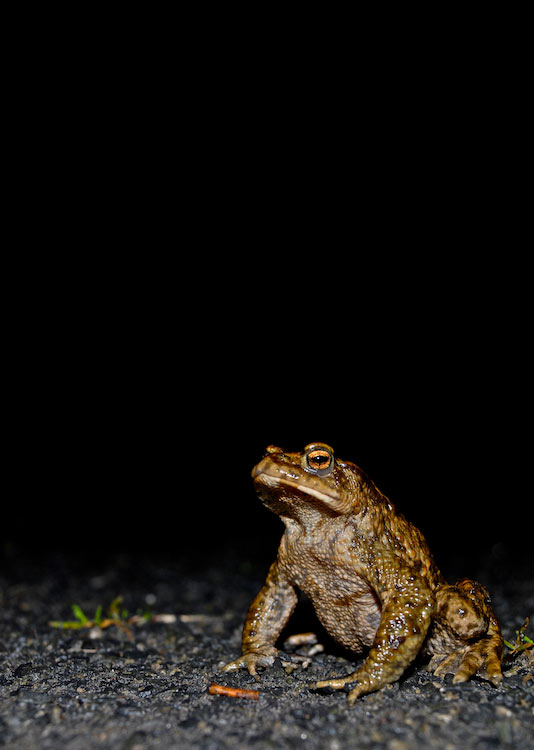Toads Anticipate Earthquakes

Get the world’s most fascinating discoveries delivered straight to your inbox.
You are now subscribed
Your newsletter sign-up was successful
Want to add more newsletters?

Delivered Daily
Daily Newsletter
Sign up for the latest discoveries, groundbreaking research and fascinating breakthroughs that impact you and the wider world direct to your inbox.

Once a week
Life's Little Mysteries
Feed your curiosity with an exclusive mystery every week, solved with science and delivered direct to your inbox before it's seen anywhere else.

Once a week
How It Works
Sign up to our free science & technology newsletter for your weekly fix of fascinating articles, quick quizzes, amazing images, and more

Delivered daily
Space.com Newsletter
Breaking space news, the latest updates on rocket launches, skywatching events and more!

Once a month
Watch This Space
Sign up to our monthly entertainment newsletter to keep up with all our coverage of the latest sci-fi and space movies, tv shows, games and books.

Once a week
Night Sky This Week
Discover this week's must-see night sky events, moon phases, and stunning astrophotos. Sign up for our skywatching newsletter and explore the universe with us!
Join the club
Get full access to premium articles, exclusive features and a growing list of member rewards.
Predicting an earthquake is notoriously difficult, yet before the ground shakes, some animals reportedly jump into action, from birds flying in unusual directions to dogs becoming restless during those pre-quake hours to days.
Most of these tales, however, aren't backed up by scientific data, until now. Breeding toads might be able to notice subtle changes in the environment before an earthquake, allowing them to flee the scene and hop to safety, according to a new study announced today.
The study researchers found that common toads (Bufo bufo) abandoned their breeding grounds five days before an earthquake struck L'Aquila, Italy, in April of 2009. The toads didn’t return for a few days after the tremor, something they almost never do.
The team also found that disturbances that occurred in the upper atmosphere before that quake correlated with the toads' movements.
"It's the first time that any study has really documented unusual behavior before an earthquake in a scientific and methodical way," lead study author Rachel Grant, a zoologist from The Open University in the U.K., told LiveScience. "We did it properly and scientifically, and consistently looked at behavior."
A fair shake
The team was studying the effect of the lunar cycle on the toads, which only breed during one month a year in a shallow pool on an Italian lakebed, when they noticed the seismic behavior. Over a 29-day period, Grant and her colleagues had been watching the toads at their breeding site, and got the opportunity to see them before, during, and after the quake.
Get the world’s most fascinating discoveries delivered straight to your inbox.
Five days before the earthquake, after spawning had just begun, the number of male toads at the site decreased by 96 percent. Six days after the last significant aftershock, the toads came back and produced the rest of their spawn.
"So they had two spawning periods, which is really unusual," said Grant.
Toads are highly sensitive to weather changes, yet no odd weather occurred before the earthquake that would have led to the exodus of toads from their breeding grounds. What did change, however, were the Earth’s magnetic field and the amount of radon gas in the groundwater, which the planet’s crust burped out before the earthquake.
The researchers aren’t sure which factor might have caused a disturbance in the upper atmosphere that was detected using very low frequency (VLF) radio sounding. Whatever the cause, the toads' reactions suggest the amphibians can sense the difference and take action to protect themselves.
Quake prediction
An earthquake detector could be particularly beneficial to toads, which move slowly and so can take hours or even days to find an area that won't be affected by a flood or a mudslide. And postponing their breeding to avoid the disaster could result in greater reproduction success, said Grant.
"I was really surprised because I wouldn’t think that earthquakes would be that dangerous to toads, but the fact that they disappeared indicates that they are," said Grant.
Determining the exact reason for that response, however, would be extremely difficult because no one knows when earthquakes will happen. The knowledge that toads can anticipate them, however, could prove beneficial in the future, said Grant.
"One day there could be a system involving amphibians as an early earthquake predictor in combination with other seismic indicators," she said.
The study is detailed in a recent issue of the Journal of Zoology.
- Top 10 Animal Senses Humans Don't Have
- 7 Terrific Toad Survival Tactics
- Can the Moon Cause Earthquakes?
 Live Science Plus
Live Science Plus










